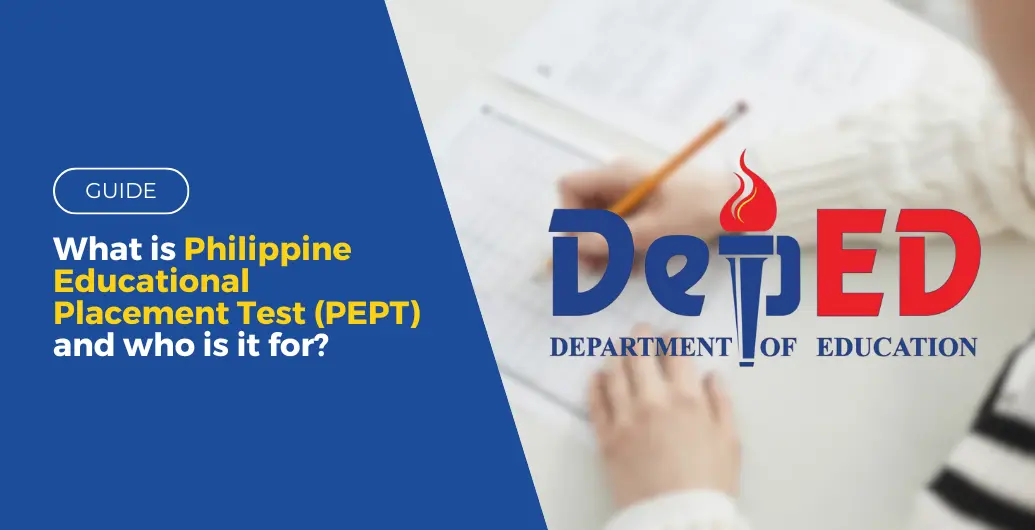Since the shift to K-12 in the Philippine education system, colleges and universities are now only accepting Senior High School graduates, pushing informal and non-formal students to ease back to formal schooling. But before proceeding to enrollment, these students must first take the PEPT Exam. So, what is the PEPT, and where can interested examinees take it? Continue reading below to know more!
Table of contents
What is PEPT?
The Philippine Educational Placement Test (PEPT), under the Accreditation and Equivalency Program (Executive Order No. 733, s. 1981), is an exam administered by the Department of Education (DepEd) through the Bureau of Education Assessment (BEA). PEPT intends to assess homeschooled children and/or out-of-school youth who plan to re-enter traditional/formal schooling at a certain level.
This test has ten levels, corresponding to each level below Senior High School. For incoming freshmen, a homeschooled student must now pass the Grade 10 PEPT and finish Senior High in any school, unlike before that PEPT results were acceptable for college applications.
The purpose is for retrieving out-of-school youth (OSY) and placing them in the formal school system if they so desire, and for validating and accrediting knowledge and skills in academic areas gained through informal and non-formal means for re-entry into formal school, job promotion, entry to job training, for employment and self-fulfillment.
Who needs to take PEPT?
As defined above, PEPT aims to evaluate and assess students who are planning to re-enter the traditional school system. Independent homeschoolers, for example, need to take and pass PEPT before enrolling in college or university.
However, DepEd clarifies that PEPT is not for annual assessment nor grade-level acceleration for homeschoolers.
What are the subjects covered in PEPT?
The subjects included in the PEPT are the following:
- English
- Math
- Science
- Filipino
- Araling Panlipunan
Each level of the PEPT covers the appropriate curriculum of the corresponding grade level.
Also Read: Civil Service Exam Reviewer with Answer Keys (2024)
PEPT Schedule and Testing Centers
The Bureau of Education Assessment (BEA), under DepEd, administers the PEPT every November in regional testing centers across the country. Metro Manila examinees can take the exam at the office of BEA inside the DepEd Complex in Pasig City.
However, in light of the coronavirus outbreak in the country, PEPT will be temporarily deferred until further notice. For updates and advisories, check out BEA’s official Facebook page here.
Results for the tests taken in November are usually released by the bureau anytime between February to March. Metro Manila takers can pick up their rating certificates at the BEA office, while provincial examinees can get theirs at their respective regional centers.
Take note: PEPT results will only be valid for the incoming enrollment in June.
Registration Requirements
Parents/Guardians and/or examinees need to prepare the following requirements:
- Two (2) copies of NSO Birth certificate, Barangay certificate, or Baptismal certificate
- Two (2) pieces of 1×1 ID pictures (recently taken)
- Two (2) copies of school permanent record (for those who had formal schooling)
- Elementary Level – Form 137* or Form 138*
- Secondary Level – Form 137*
- Registration fee (non-refundable):
- Regular administration (every November) – PhP50.00
- Walk-in/Special administration – PhP200.00
To register, just contact the BEA or its nearest regional center (for provincial applicants).
*Form 137 (Transcript of Records with school seal and signature of principal/registrar); Form 138 (Report Card with school seal and signature of principal/registrar)
Also Read: Philippine Scholarships for SY 2024-2025 (Online Application)
Final Thoughts
The PEPT can provide hopeful students an opportunity to continue their education despite unconventional or interrupted learning paths. Whether they’re out-of-school youths, homeschoolers, or adults who want to complete their basic education, PEPT offers a path to validate and recognize their learning. In turn, DepEd shows its commitment to inclusive education, ensuring that each learner has the chance to continue their education.

Leave a Reply